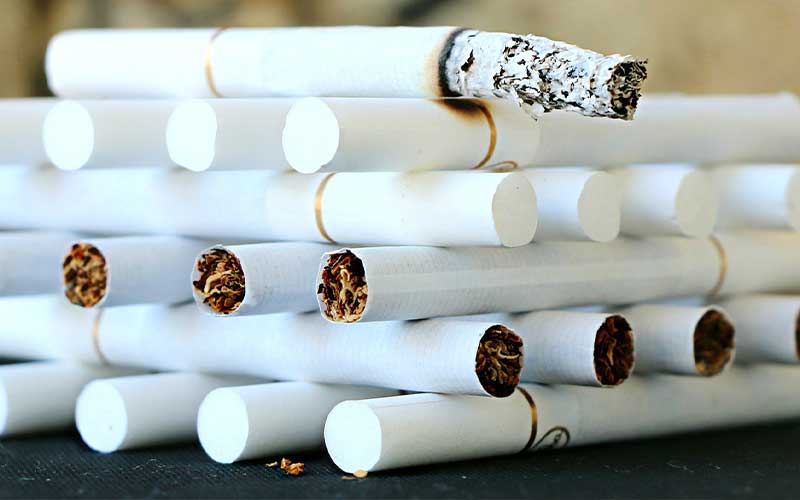How much does smoking cost Britain? We all know smoking is bad for your personal finances. If you’re smoking 20 a day, you’re spending nearly £5,000 a year. That’s enough for a fancy all-inclusive holiday or to buy takeaway pizza for tea every single night. However, did you know that smoking affects everyone’s finances, even people that don’t smoke? Yep – sad but true. Smoking is that much of an expensive habit. It costs the NHS lots of money, means people have to take time off work, and causes damage to infrastructure and buildings. ‘Hang on’… you might be saying. ‘Don’t the taxes on smoking help fund things in the country?’ Unfortunately, this is a common misconception, often mumbled by your Uncle Dave in the pub after half a bottle of Teacher’s and a 20 pack of Silk Cut. It’s true that tobacco duty goes back to The Government, which uses it to fund the NHS and other public health initiatives. With the increase in duty announced in the 2023 budget, tobacco duty currently accounts for about £4.90 for a pack of 20 cigarettes, plus 16.5% of the retail price. So while The Treasury does get just over £10 billion a year from tobacco duty, it’s still running at a loss when you consider the overall impact of smoking on the economy. Let’s do a deep dive into some of the ways smoking can affect the country’s coffers. Smoking and the NHS Smoking and productivity in the workplace Smoking and environmental cleanup Smoking and fires So can vaping turn things around? In summary: Is smoking the reason why we can’t have nice things? Smoking and the NHS This is the biggie – smoking costs the NHS in England £2.6 billion a year. And that’s just one part of the country – it costs the Scottish NHS £780 million a year, the Welsh NHS £302 million a year, and hospitals in Northern Ireland £164 million a year. Smoking is the leading cause of preventable death in the world, causing a myriad of diseases, from COPD and stroke to heart disease and cancer. This puts a lot of pressure on the NHS in helping to cure and alleviate these diseases. Not only this, but smoking adversely affects the healing process. This means smokers are more likely to experience complications after surgery and require longer hospital stays. Smoking also indirectly causes other health problems. For example, smoking affects the body’s ability to absorb calcium, leading to brittle bones and conditions like osteoporosis. Smokers are twice as likely to have problems conceiving than non-smokers, and women are more likely to experience menopause sooner. These issues cost the NHS money to manage, not just through surgery but medication and therapy. Second-hand smoke is also a major issue – when people smoke, they’re harming not just themselves but their family and friends. It’s estimated that people exposed to second-hand smoke have a 30% increased chance of developing lung cancer and a 35% increased risk of heart disease. It’s vital to throw social care in the mix here too. It’s estimated that smokers need help ten years earlier than non-smokers. This puts the strain on local authorities and adult social care services to the tune of £1.2 billion a year. Smoking and productivity in the workplace Most people just think of the NHS when it comes to how much smoking costs Britain. However, there are other things to consider as well. Smokers are more likely to be absent and take sick days at work, as well as cost more in pensions and benefits. Studies have shown that it costs companies £4,600 more to hire a smoker than a non-smoker a year. Not only this, but smokers are more likely to experience irritability and impatience at work, potentially affecting performance and output. Nobody wants to go into a Zoom meeting with someone going through nicotine withdrawal! Let’s talk about smoke breaks at work. It’s estimated that smoke breaks throughout the day cost businesses £8.4 billion a year in lost time. And if your non-smoking staff demand to take breaks at the same time in order to ensure equality, that figure only goes up! On a more depressing tangent, smokers are more likely to die or have to take long-term sickness when they’re still of working age, meaning a further blow to the economy. Smoking and environmental cleanup Have you played ‘avoid the soggy cigarette tabs’ on the commute to work or while taking the kids to school? If the answer is yes, you’ll know all about the environmental issues that smoking can cause. It’s estimated that cleaning and disposing of cigarette butts costs local councils about £40 million a year. And while councils do come down hard on those that they catch littering, most people are unfortunately getting away with it. Cigarette butts contain over 4,000 toxic chemicals that can pollute the earth and waterways, causing damage to wildlife and destroying our fragile ecosystems. So while we have an idea of how much it costs to clean up cigarettes, we don’t completely know the cost in terms of long-term harm to the environment. There are also more minor costs involved in removing smoke from homes, vehicles, and buildings too. Nobody wants to smell like they live or work inside an ashtray, after all! Smoking and fires We’ve all seen the ads on the telly where someone lights a cigarette in bed, and boom – the whole house is on fire before you know it. Unfortunately, smoking remains the top cause of fatal fires, with about 25% of fire-related deaths caused by cigarettes. While we don’t have specific statistics for how much fire damage costs fire and rescue services across the UK, callouts aren’t cheap. Plus, as fires caused by smoking are preventable, it means that fire and rescue services may not be able to attend other emergency situations, compounding the damage even further. When you factor in insurance costs, loss of livelihood, and property damage, it’s easy



